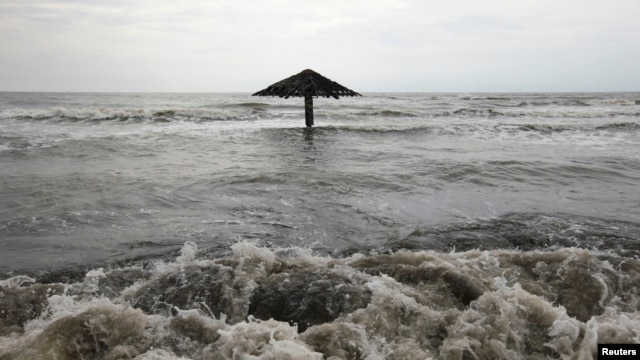Report: Cutting Short-Lived Pollutants Slows Sea Level Rise
 |
| Waves are seen crashing ashore at Mayangan village in Subang in Indonesia's West Java province (file photo). |
There's still time to slow the rising of sea levels around the world, according to a new report from climate scientists, and their strategy does not focus on carbon dioxide.
CO2 building up in the atmosphere and trapping solar heat over the past century is widely blamed for today's melting glaciers, shrinking ice sheets and rising ocean waters. But other heat-trapping pollutants have a more short-term impact, and the researchers say cutting those emissions could be a more effective way to slow the rate of climate warming and reduce sea-level rise.
They identify methane, tropospheric ozone, hydrofluorocarbons and black carbon as pollutants that could be targeted, with technologies that already exist, to drastically cut their release. Quickly implementing that strategy could off-set warming temperatures by up to 50 percent by 2050, and reduce sea level rise by 22 to 42 percent by the end of the century. Delaying emission cuts would reduce the beneficial impact.
In their report, published in Nature Climate Change, the researchers stress that carbon dioxide is still the most important factor in sea level rise over the long term. But co-author Warren Washington of the National Center for Atmospheric Research notes that "we can make a real difference in the next several decades by reducing other emissions."
CO2 building up in the atmosphere and trapping solar heat over the past century is widely blamed for today's melting glaciers, shrinking ice sheets and rising ocean waters. But other heat-trapping pollutants have a more short-term impact, and the researchers say cutting those emissions could be a more effective way to slow the rate of climate warming and reduce sea-level rise.
They identify methane, tropospheric ozone, hydrofluorocarbons and black carbon as pollutants that could be targeted, with technologies that already exist, to drastically cut their release. Quickly implementing that strategy could off-set warming temperatures by up to 50 percent by 2050, and reduce sea level rise by 22 to 42 percent by the end of the century. Delaying emission cuts would reduce the beneficial impact.
In their report, published in Nature Climate Change, the researchers stress that carbon dioxide is still the most important factor in sea level rise over the long term. But co-author Warren Washington of the National Center for Atmospheric Research notes that "we can make a real difference in the next several decades by reducing other emissions."
http://www.voanews.com

Comentários
Postar um comentário